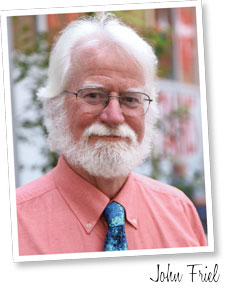1/1/2024
The More Things Change
John Friel

Coincidentally, just weeks apart, three friends gave me books with unexpected connections.
One deals with farming, but wanders into politics and philosophy. The second focuses on gardening and fashions therein. The third links them in ways I should’ve seen coming, but didn’t.
The first book: “One Man’s Meat” by E. B. White. The second: “Onward and Upward in the Garden” by Katherine White. The shared surname is no coincidence: They were husband and wife. They met when she was his editor at The New Yorker magazine—which is where the third book comes in: “Here At The New Yorker,” a memoir by Brendan Gill.
If you’ve ever read to a child, you’ve met E. B. as the author of “Charlotte’s Web.” If you studied English composition, you know him as co-author of “The Elements of Style,” the slender guide considered among our language’s most influential books. Kudos to Katherine: It takes serious chops to second-guess the writer who rewrote the writers’ bible.
Consider this ode to poop: “The basic satisfaction in farming is manure, which always suggests that life can be cyclic and chemically perfect and aromatic and continuous.” E. B. arrived at that epiphany by way of sheep farming and by watching his home-brewed compost tea, enriched by ovine droppings and kept in an old Scotch bottle, rejuvenate a languishing, decades-old rubber tree.
A flash of kindred spirits glimmered when E. B. described building a boat, something we both dreamed of for decades and finally got around to. Mine is a canoe; his, a flat-bottomed scow, more practical for his coastal Maine farm.
That light of recognition glowed again when he railed against serving as an unpaid marketing messenger because the state emblazoned his license plates with “Vacationland.” I chafe at the indignity of too-visible brands on clothing, unwillingly advertising wares on my body—although I’ve cheerfully donned free logowear for chores like chainsawing or working trade shows.
“Onward and Upward” contains a lengthy essay on flower catalogues, which Mrs. White critiqued as if they were literary works. As a former catalogue writer, I shudder to think of my efforts falling under that stern gaze. Luckily, our times didn’t coincide; I was six when that essay was published. And I focused on wholesale, not retail, so the odds of her reviewing my work were slim even had we been contemporaries.
She eagerly followed, and purchased, breeding advances from Star Roses, Swan Island Dahlias, Burpee, White Flower Farm and others, but didn’t always approve, sniffing at “change for the sake of change,” turning flowers into “shapeless blobs of color.” I’m similarly on the record advocating new hybridizing, but averse to morphing multiple genera, even sprawling gaura, into flowering meatballs—good for the industry’s bottom line, but (it says here) not for gardens and gardeners.
So the Whites’ books are eccentric collections of highly opinionated essays, first published in The New Yorker and Harper’s from the 1930s into the ’50s. The prose styles reflect their time, with an elegance in vocabulary and cadence today’s content providers might find flowery. Gill’s memoir recaps his six decades at the magazine and colorfully exposes the eccentricities of 20th century literary luminaries. My hero James Thurber gets some scathing swipes. The Whites, by contrast, are cast in an admiring, almost loving, light.
Mrs. White evidently lived her later years vicariously, traveling only via books and imagination. Her descriptions of, say, Winterthur or the great English gardens are informed by print and photographs, not actual visitation. But then, the essays span a general decline in health of both Whites. Gill praises their “mountain of good work” done in “seesaw fashion,” where “one got well in time for the other to get sick.”
I admit it’s nervy to hang the slightest kinship with a major writer on two tenuous connections: We both built boats and both hated being uncompensated spokesmen. Or, for that matter, to nod knowingly at his editor simply because one of our prejudices overlapped.
He wrote “Charlotte’s Web” and “Stuart Little.” She edited, and no doubt improved, him and many other famous writers. I’ve done no such things.
But as he described the painful process that produced her essays, “The editor in her fought the writer every inch of the way.” That conflict I can honestly claim we had in common. It may be mere coincidence, but it will suffice. GP
John Friel is a freelance writer with more than 40 years of experience in horticulture.